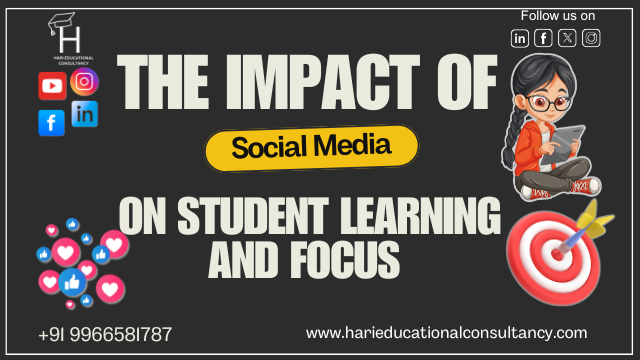In today’s digital era, social media significantly impacts student learning and focus. While it offers educational resources and networking opportunities, it also leads to distractions that can affect academic performance. Understanding the balance between its benefits and challenges is crucial for students to maximize their learning potential.
Benefits of Social Media in Education
- Access to Educational Resources
Social media platforms provide students with access to a wealth of educational content, including online courses, study materials, and academic discussions. Platforms like YouTube and LinkedIn Learning offer valuable learning opportunities. - Enhanced Collaboration and Communication
Students can connect with peers, professors, and academic experts worldwide. Group discussions and online study forums enable the exchange of ideas and improve collaborative learning. - Exposure to Global Trends
Social media keeps students updated on global educational trends, new research, and industry insights, helping them make informed career decisions. - Skill Development
Platforms like LinkedIn, Coursera, and even TikTok provide students with soft and technical skill development courses that help them prepare for their future careers.
Challenges of Social Media on Student Focus
- Distraction and Reduced Concentration
Constant notifications and scrolling through social media can disrupt a student’s focus and reduce study time, leading to poor academic performance. - Decreased Productivity
The addictive nature of social media can lead to procrastination, causing students to delay important assignments and studies. - Information Overload
Excessive exposure to information, opinions, and debates can overwhelm students, making it difficult to focus on critical learning materials. - Mental Health Concerns
Social media can contribute to stress, anxiety, and low self-esteem, especially when students compare themselves with others, leading to decreased motivation for studies.
How to Use Social Media Wisely for Academic Growth
- Set Time Limits: Use apps that track and limit your time on social media to avoid excessive usage.
- Follow Educational Pages: Subscribe to academic channels and follow institutions that provide valuable knowledge.
- Use Social Media for Networking: Connect with professors, alumni, and industry experts to gain insights into academic and career opportunities.
- Engage in Meaningful Discussions: Participate in educational groups and forums to enhance learning.
- Avoid Multitasking: Focus on studies without interruptions from social media notifications.
Conclusion
Social media is a powerful tool that can positively or negatively impact student learning and focus. When used wisely, it can enhance academic performance and provide vast learning opportunities. However, students must be mindful of its distractions and set boundaries to ensure they stay focused on their educational journey.
At Hari Educational Consultancy, we guide students in making informed decisions about their academic and career paths, ensuring they stay on track for success. For expert career counseling and university admissions, contact us today!
Contact Us
📞 Phone: +91 9966581787
🌐 Website: www.harieducationalconsultancy.com

